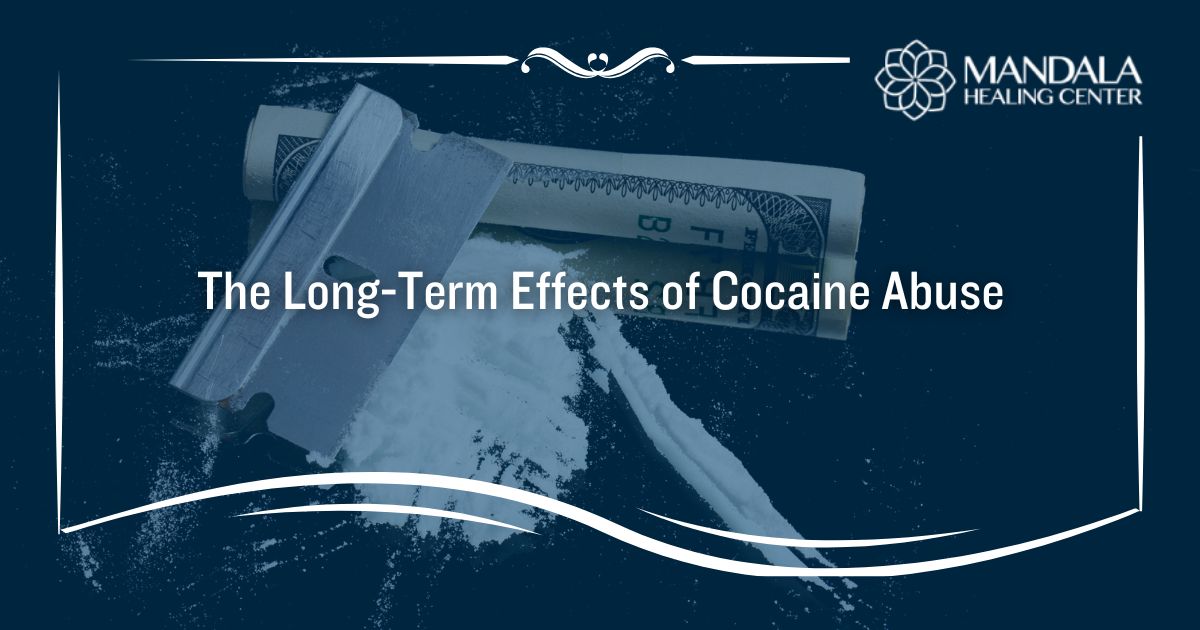Cocaine is a highly potent stimulant drug that people abuse to experience increased energy and euphoria. Because the high associated with cocaine is short, people often binge on it. This increases the likelihood of developing a long-term cocaine use disorder.
According to the U.S. Department of Justice (DOJ), 27,788,000 people aged 12 or older have abused cocaine at some point in their lifetime.
While cocaine is a dangerous drug, its use has become normalized in American society. People no longer view cocaine as a hard drug and often use it during parties, at clubs, or to enhance their ability to work long hours. Unfortunately, there are many physical and mental health risks associated with long-term cocaine use.
Abusing cocaine long-term can lead to cardiovascular risks like high blood pressure and heart attacks. It can also lead to respiratory problems, brain damage, mental health issues, and life-threatening overdoses. Because of this, you should always seek professional cocaine addiction treatment when you are struggling with chronic cocaine use.
In this article, you will learn:
- What are the effects of cocaine
- What are the long-term dangers of abusing cocaine
- What are the signs of cocaine overdose
What are the Effects of Cocaine?
As a central nervous system stimulant, cocaine increases activity in your brain and body. This is why it can cause symptoms like increased energy and a lessened need for food and sleep.
Most people who abuse cocaine snort the drug. Snorting cocaine causes the effects to begin almost instantaneously. That said, the effects usually wear off within 30 minutes.
The effects of cocaine include:[2]
- A rush of euphoria
- Increased energy and focus
- Talkativeness and heightened self-esteem
- Decreased need for food and sleep
- Constricted blood vessels
- Dilated pupils
- Increased body temperature and sweating
- Heightened heart rate and blood pressure
- Feelings of anxiety, panic, or paranoia
- Aggressive or violent behavior
Abusing cocaine with other drugs like alcohol increases the risk of experiencing an overdose.[1] That said, binging on the drug can also lead to fatal toxicity. If you or a loved one abuse cocaine, you should seek professional treatment for cocaine addiction.
What are the Long-Term Risks of Cocaine Abuse?
Once you become addicted to cocaine, you will be using it frequently. This puts you at a higher risk of experiencing long-term physical and mental health effects. Knowing the long-term dangers of cocaine misuse might motivate you to seek help for your substance use disorder.
The long-term dangers of cocaine abuse include:
Cardiovascular Effects
Chronic cocaine use can damage your cardiovascular system. This is because cocaine is a stimulant that puts a strain on your heart. You could experience high blood pressure, heart disease, heart attacks, stroke, and even sudden death.[3]
Respiratory Issues
When you snort cocaine, it causes nasal congestion, frequent nosebleeds, and eventually perforation of the septum. However, smoking cocaine can lead to respiratory distress. You could develop a chronic cough, lung damage, and an increased risk of respiratory infections.[4]
Brain Damage
Prolonged cocaine use can lead to neurological issues and brain damage. You might experience memory loss, cognitive impairment, and an increased risk of life-threatening problems like strokes or seizures. You could even develop a condition called fatal encephalopathy.[5]
Mental Health Problems
Another thing to consider is how prolonged cocaine abuse affects your mental health. You could experience an increase in depression, anxiety, mood swings, insomnia, and more.
Because of cocaine’s stimulant properties, you could also develop substance-induced psychosis.[6] This would lead to symptoms like detachment from reality, paranoia, delusions, and hallucinations.
Overdose
Lastly, chronic cocaine abuse increases your risk of experiencing an overdose.
As you develop an addiction, you also gain a tolerance for cocaine. Because of this, you will begin using larger doses of cocaine to experience the desired effect. This makes you more susceptible to overdosing.
The symptoms of a cocaine overdose may include:[7]
- High body temperature and excessive sweating
- Mental confusion
- High blood pressure, fast or irregular heartbeat, and chest pain
- Fast or difficulty breathing
- Blue tint to lips or fingernails from a lack of oxygen
- Loss of urine control
- Seizures
- Death
If you believe someone is experiencing a cocaine overdose, call 911 immediately. Emergency medical professionals can provide your loved one with life-saving treatment to prevent the overdose from becoming fatal. After the overdose is treated, the hospital can connect you with a reputable cocaine addiction treatment center.
Find Help for Cocaine Addiction
If you or a loved one suffers from cocaine addiction, it’s time to seek professional help. Long-term cocaine use can lead to heart complications, respiratory problems, brain damage, and mental health issues. Thankfully, drug rehab programs can help you overcome cocaine addiction before it’s too late.
At the Mandala Healing Center, we offer compassionate, evidence-based, and individualized addiction treatment. In other words, we will provide you with the tools and support you need to achieve long-term recovery.
Contact us today for more information on our cocaine rehab center.
References:
- The U.S. Department of Justice: Powdered Cocaine Fast Facts
- The National Institute on Drug Abuse (NIDA): Cocaine
- The American Heart Association (AHA): Cardiovascular Effects of Cocaine
- Springer Link: Respiratory Complications of Cocaine Abuse
- BMJ Journals: Fatal encephalopathy after an isolated overdose of cocaine
- Merck Manuals: Substance-/Medication-Induced Psychotic Disorder
- Medscape: Cocaine Toxicity
















